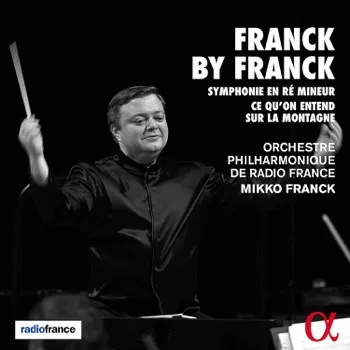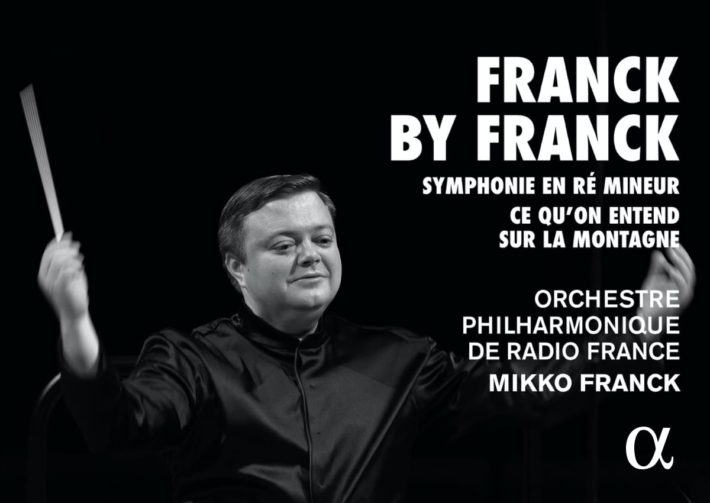César Franck’s Symphony in D minor was a staple of 20th century orchestral repertoire, and remains one of Franck’s best known works. Parisian audiences initially bristled at the German-sounding symphonic work, but audiences elsewhere, free of such political considerations, were captivated by the symphony’s appealing melodies and Romantic narrative structure. The piece has fallen in the 21st century pecking order, with few performances and fewer recent recordings, so this new album from Mikko Franck and Orchestre Philharmonique de Radio France (OPRF) is welcome. Franck and OPRF take a decidedly contemporary approach, with minimal rubato and a sound that values control over drama.

The opening Largo, with low string melodies and modulations reminiscent of the opening of Berlioz’s Symphonie Fantastique, almost feels urbane with such minimal vibrato in the low strings and such a straight tempo. Nothing is ghostly or murky here; the entire orchestra seems to be sketching with very clean lines. A good comparison here and throughout is Pierre Monteux’s recording with the Chicago Symphony Orchestra, who take more time in the Largo, and who achieve an entirely different sort of orchestral sound; the CSO’s sound is less unified, with more complex layers. It’s interesting to hear how each conductor takes advantage of their orchestra’s sound.
In the rough sonata form that follows, Franck and OPRF continue mostly to paint inside the lines, and their keen attention to detail lets the music come through clearly. The strings sound rich and woody as they pass around flowing, arpeggiating figures. Woodwind and brass intonation is spot on in solo and ensemble moments, and their tutti sound is always complementary to the strings, enriching its color. Franck uses this to achieve strong continuity. Monteux’s CSO, not surprisingly, is more boisterous throughout, and more attentive to the episodic nature of the music. Listen to both sets of winds just before the development (OPRF 8’20”, CSO 8’25”) – it’s a subtle difference, but it communicates the spirits of the two orchestras. There is a similar effect in the development, where the cellos have rising pizzicatos for a few bars. To Monteux (or, perhaps, to whoever mastered the recording), the pizzicatos are a new feature to be focused on, and have a bubbling, almost laughing effect; the same to Franck are only an accompaniment to the continued melodic line. The contrast continues through to the movement’s climactic ending, though OPRF do generate some heat in the final approach.
In the joyous third and final movement, OPRF’s rendition flows along like a happy river within its banks. Everyone from the low brass to the flutes gets to show off a bit, and they sound ebullient doing so. But in the return of the first movement’s plaintive theme, with the quasi-angelic harp, inverted and unstable harmonies (all indicating that something special is occurring), the OPRF can’t quite generate enough distinction with the other sections of the movement.
If Franck’s approach with OPRF is too straightforward in the outer movements, it makes more sense in the inner Allegretto. The evoked atmosphere is magical, serious but still full of life. The narrative unfolds imperceptibly, until the listener is surrounded by two themes in full conversation. Again, there is a sense of continuity, of one long, complex scene in a film.
Cesar Franck’s “Ce qu’on entend sur la montagne” (“What one hears on the mountain”), written almost forty years before the symphony, fills out the second half of the album. The rarely heard piece is a tone poem depiction of Victor Hugo’s poem of the same name, which discusses the relationship between humankind and nature on an epic scale. The composition is not particularly good, with extremely minimal melodic material and repetitive ostinato figurations throughout. Still, Franck and OPRF give it a good showing. Franck allows the drama to grow slowly and steadily, the music at times seeming to rise like a mountain. The woodwind solos are sometimes misty and ethereal, sometimes tender and human.
This album has all the trappings of a 21st century release – rich, clear sound quality, impeccable individual musicians, and an informative booklet – and yet the clearest takeaway upon listening to it is that much older recordings of the same piece have aged very well. Among them, I would choose Monteux or Maazel with the Berlin RSO over this version; Still, for those in search of a lean, contemporary take on Cesar Franck, one that takes its cue from period instruments performances (Herreweghe’s version comes to mind) but uses modern instruments – this would be the right recording.
“Franck By Franck
César Franck – Symphony in D minor
“Ce qu’on entend sur la montagne”
Orchestre Philharmonique de Radio France
Mikko Franck – Conductor
Alpha Classics, CD ALPHA561




















